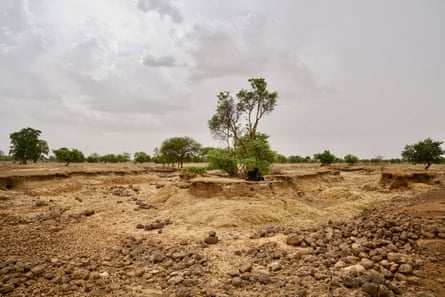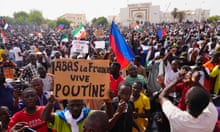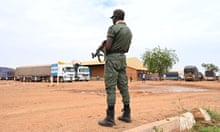The food is all finished and until the rains come no planting can be done in southern Niger.
Three-month-old twins Hassan and Husseina are in intensive-care beds at a clinic in Aguié, watched over by their mother, Hadjara Hamissou. They were admitted a few days ago, their frail bodies wasted by hunger. Each weighs under 2kg (4lb, 4oz), less than half the healthy weight for their age.
“I carried them here on foot,” says Hamissou. “At home in our village, it is a very desperate situation. The rainy season has not started so we cannot plant, and we have finished all our food. Everyone is suffering.”
More than a dozen other malnourished children are clinging to life in the unit, while behind a screen a medical team attempt to resuscitate a 20-month-old boy.
They are unsuccessful. A porter carries his small body out of the room, wrapped in a purple cloth, as Hamissou and the other mothers in the ward watch in silence.
“His parents waited several days to bring him and by the time they came, it was too late,” says Al-Mustafa Amadou, one of the nurses. “We could not do anything to save him.”
Niger is on the frontline of the climate crisis. Increasingly erratic rainfall and longer dry seasons mean that many parts of the country have not had a good harvest in a decade. Temperatures are rising 1.5 times faster here than the rest of the world, leading to a cycle of droughts that are eroding the 14% of land that is arable. Last year there was a 39% drop in cereal production.

Jihadist violence has spilled over from neighbouring Mali and Nigeria, uprooting hundreds of thousands of people, while the economic shock of the war in Ukraine 2,800 miles away has sent food prices soaring.
About 44% of Niger’s children are malnourished and 4.4 million people – 18% of its population – are predicted to face crisis levels of food insecurity or worse this year, twice as many as last year.
Underresourced humanitarian agencies only have funds to help 3.3 million people, leaving more than a million without the aid they need, as donors grapple with other crises, including Ukraine and east Africa’s drought.
A recent emergency response plan from Niger’s government to deal with the crisis has a shortfall of $200m in its $280m budget, while the UN’s World Food Programme slashed rations to those it helps in Niger by 50% in January as the global food crisis bites.
“The population is on the brink of a dire humanitarian crisis,” says Ilaria Manunza, of Save the Children, which helps fund the clinic in Aguié. “In fact, we are already in the middle of it – the child malnutrition rate is one of the highest in the world.”
At the clinic, the human toll is stark. Its medical director, Moussa Bubakar, says 100 children are now being treated for severe malnourishment, and he expects that number to double in the coming months. Children will have to share beds because there will not be enough to go round. The facility also lacks oxygen, blood and fuel for its single ambulance.
“Over the last three years, we have seen a big increase in malnutrition cases,” says Bubakar. “We don’t have enough resources to adequately treat them. We need more support.
“Children are dying from malnutrition in the countryside because their families do not have enough money to bring them here. They just die at home. Last week we had 10 children who passed away from malnutrition at the clinic and just one doctor to care for 100 children. We are trying to employ another doctor, but even two is not enough.”

In the bed next to Hassan and Husseina, Jamila Lawal’s four-year-old daughter, Mabaraka, is being treated for malnutrition, malaria and scabies. A cannula in her hand, the girl breathes heavily as her mother fans her.
Lawal’s six children regularly miss breakfast and lunch, because there is not enough food for three meals a day. For dinner, they eat a thin millet porridge, a starchy staple lacking in nutrients.
“Because of bad rainy seasons, we are having more and more problems,” Lawal says. “If the rains come, things will improve, but whether or not they will start soon, only God knows.”
Like other Sahel countries, Niger sees a big rise in child malnutrition cases during the “lean season” – the gap between harvests that lasts for about four months, starting in June. But doctors and humanitarians say these spikes are becoming more pronounced as the climate crisis bites.
The lean season is starting earlier than expected as poor rains mean failed harvests, leaving families unable to replenish stocks or feed themselves.
At his compound in Aguié, decorated with colourful murals and full of sand blown in from the surrounding desert, the region’s traditional leader, Brazaki Nouhou, says hundreds of families have left their homes in search of food.
“In many villages you cannot see any people, they have all left,” he says. “We are facing a serious food crisis. There is no rainfall, and even when the rains do arrive, we don’t have the seeds to plant, or they stop suddenly … Everything is becoming very expensive. You see a lot of men and women begging for food.”
“We used to have enough rainfall and could plant,” Nouhou, 75, says. “Now we do not. Things are getting worse and worse every year.”
The situation is similar in Burkina Faso and Mali, where people cannot be reached because of jihadist violence. In total, 41 million people across west Africa are facing food insecurity this year, a number that has quadrupled since 2019.

“The numbers don’t look great by any stretch,” says Paolo Cernuschi, Niger director for the International Rescue Committee (IRC). “We already had critically high malnutrition rates, with climate change and insecurity. Now we have the war in Ukraine piled on top and food prices have reached all-time highs.”
Like other aid agencies across the continent, the IRC has been forced to scale back its operations amid soaring fuel and food prices. On Thursday, David Beasley, head of the WFP, said the economic shocks of the Ukraine war had caused his organisation’s operating costs to rise by $70m a month. As a result, the WFP has reduced people’s rations and was recently forced to suspend some operations in South Sudan, where it feeds 6 million people.
Ali Bandiare, president of the Nigerien Red Cross, says the crisis is the worst in the past decade: “And at the same time, it is one of the least funded. The war in Europe is adding to this problem. We fear redirecting humanitarian budgets to [deal with] the Ukraine crisis risks dangerously aggravating the situation.”
At El-Kolta village, a few miles from Aguié, Tsakani Abdu was leaving for her fields to plant a bucket of cassava stems. Like others in the area, she had not eaten that day because she had no food.
“There are a lot of children suffering from hunger in this area,” says Abdu. “The land is poor now and we don’t have good seeds but we have large families to feed.
“What can we do? We just pray for rain.”









